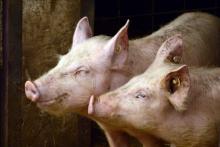Organisms
First Case of African Swine Fever in Silistra, a Farm with 17,000 Animals Is Affected
The Bulgarian Food Safety Agency (BFSA) has established a new outbreak of African swine fever (ASF) at an industrial farm in the village of Popina, Sitovo municipality, Silistra district. The positive samples were laboratory confirmed today, July 30, 2019, by the National Reference Laboratory at the National Diagnostic Veterinary Research Institute in Sofia.
Athens Introduces Additional Control Over ASF in Bulgaria and Romania
Greece has introduced a high level of vigilance and border control with Bulgaria to prevent the spread of African swine fever, the BNR said.
The Agrarian Ministry, as well as all food control services, are paying close attention to the spread of African swine fever in Bulgaria and Romania.
EC Experts Join Efforts to Halt Spread of African Swine Fever in Bulgaria
Veterinary experts from the European Commission arrive in Bulgaria on July 23. The inspectors check whether the measures taken by our country against the spread of African swine fever are adequate and timely.
Outbreaks of the African swine fever have been found in more than ten regions in Bulgaria.
Invasion of Black Scorpions in Burgas
From the heat and the humidity black scorpions were scattered in Burgas. About the fearsome invasion, a reader of the flagship site, Flagman.bg, found a member in his bathroom in an apartment on Rilska Street in the city. The scorpion is 5-6 cm in size.
The man says that every year in the summer they notice the scorpions creeping through residential complexes, but not at home.
- Read more about Invasion of Black Scorpions in Burgas
- Log in to post comments
Bulgarian Government Has Voted 3.7 million to Fight African Swine Fever
The government has voted 3.7 million to fight African swine fever.
6 are the outbreaks of African swine fever in Bulgaria, and the authorities take immediate action to prevent the spread of the disease.
Ocean Warming Brings the Great White Sharks in European Waters
Warmer waters off the coast of Devon and Cornwall could result in more sightings of the fearsome ocean predator in the coming decades.
There are already 40 different species and an estimated 10 million sharks in our waters - but that number could be set to grow over the coming decades.
New Type of Pollution: Plastic Waste Is Already Incrusting in the Rocks
Scientists have identified a new type of plastic pollution in the sea - melted and incrusted in rock waste, Associated Press reported.
The phenomenon is noticed near Madeira in 2016. The now polluted area has increased and plastic stains are more. They are mostly blue and gray and in different sizes. Scientists called them "plastic crust".
Pandas in the Zoo in Moscow Listen to Putin's Voice
This will help to adapt the new inhabitants of the Moscow Zoo, reported NOVA TV.
The new inhabitants of the Moscow Zoo - the two pandas will listen to Russian President Vladimir Putin's voice through the speakers in the framework of the adaptation procedure, Vesti.ru and BGNES reported.
Stressed out? Your dog may feel it too, study suggests
When dog owners go through a stressful period, they're not alone in feeling the pressure - their dogs feel it too, a new study suggests.
China's panda diplomacy puts a smile on 'best friend' Putin's face
Chinese President Xi Jinping presented two pandas to Moscow's zoo at a ceremony with Vladimir Putin on June 5, in a gesture the Russian president described as a sign of deepening trust and respect between the two powers.










